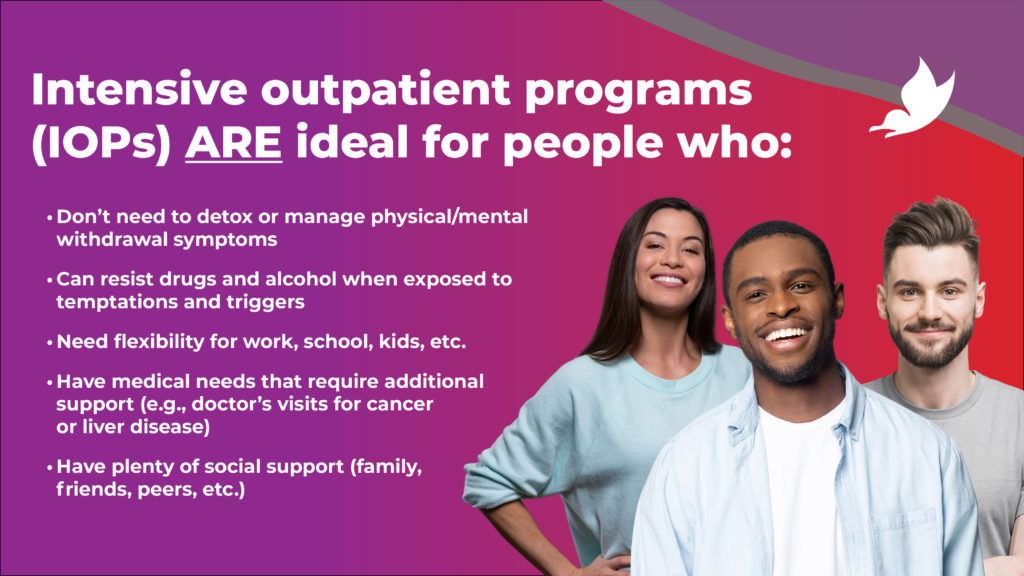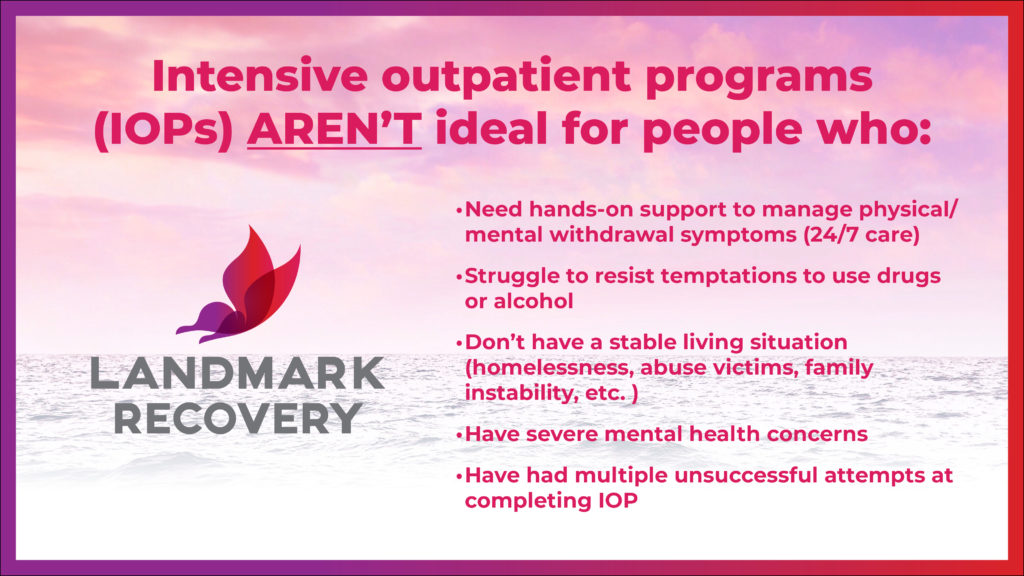Updated: July 19, 2023, at 5:03 p.m.
An In-depth Guide to Intensive Outpatient Rehab for Alcohol and Drug Addiction
Table of contents:
- What is IOP?
- IOP Program Requirements
- What to expect during IOP
- Who should consider an IOP
- How long do IOPs last?
- Mental Health Intensive Outpatient Program Curriculum
- How to Find an IOP Near You
- Benefits of IOPs
- IOP vs. Other Treatment Options
- How to Prepare for an IOP
- Common Misconceptions about IOPs
- IOP Testimonials: Real Stories of Recovery
What is IOP?
IOP, which stands for “intensive outpatient program,” is a higher level of care that treats people with drug and alcohol addictions and co-occurring mental health problems. IOPs are considered a step down from residential treatment programs (aka, inpatient rehab) and PHPs (Partial Hospitalization Programs).
IOPs Offer Flexible Addiction Treatment Options
While IOPs can help people transition back to their regular lives after leaving the controlled and structured living environment inpatient rehab provides, some people may begin their addiction treatment with an IOP. The outpatient treatment model is a good option if you’re looking for flexible addiction treatment and don’t need around-the-clock care. One of the key considerations is whether you’re in a place where you’re not pressured to use drugs or alcohol and are stable enough to live outside a highly controlled environment.
IOPs offer freedom of movement, meaning patients get to go home every night, versus inpatient programs, where patients live at treatment centers full-time. You can attend IOP without completing inpatient rehab. However, addiction professionals recommend completing residential treatment before IOP to ensure patients are fully equipped with recovery resources and peer support before returning home full-time.
@landmarkrecovery And thats a fact! #overcomeyourmind #thisislivinglife #youdobelong #learningtoliveagain #learningtolive #overcominglimitingbeliefs
IOP Program Requirements
While IOPs can help people transition back to their regular lives after leaving the controlled and structured living environment inpatient rehab provides, some people may begin their addiction treatment with an IOP. The outpatient treatment model is a good option if you’re looking for flexible addiction treatment and don’t need around-the-clock care. One of the key considerations is whether you’re in a place where you’re not pressured to use drugs or alcohol and are stable enough to live outside a highly controlled environment.
What to expect during IOP
Outpatient treatment, or IOP, usually comes after patients complete residential treatment. After detoxing and learning to manage negative emotions, substance cravings, and temptations, patients go to IOP to help them transition back into their day-to-day lives and achieve long-term recovery goals. You can usually work or attend school while enrolled in an intensive outpatient program.
Many addiction treatment providers can schedule IOP meetings during early mornings or late afternoons. Some group counseling or therapy sessions may be scheduled in the evening. Typically, you’ll attend meetings three to five times a week.
During IOP, patients can expect to accomplish these goals through the use of techniques and training that include:
- Individual therapy
- Group therapy
- Family therapy
- 12-Step approach
- Relapse prevention
- Self-care
- Job training
- Mindfulness training
- Peer recovery support
- Life skills
Who should consider IOPs?

Intensive outpatient programs (IOPs) are ideal for people who:
- Don’t need medical detox or manage physical/mental withdrawal symptoms
- Can resist drugs and alcohol when exposed to temptations and triggers
- Need flexibility for work, school, kids, etc.
- Have medical needs that require additional support (e.g., doctor’s visits for cancer or liver disease)
- Have plenty of social support (family, friends, peers, etc.)

IOPs may not be suitable for people who:
- Need hands-on support to manage physical/mental withdrawal symptoms (e.g., 24/7 care)
- Struggle to resist drugs and alcohol
- Don’t have a stable living situation (homelessness, abuse victims, family instability, etc. )
- Have severe mental health concerns
- Have had multiple unsuccessful attempts at completing IOP
If you decide that IOP isn’t ideal for your current situation, consider the 24/7 care of a residential treatment program.
How long do IOPs last?
Intensive outpatient programs usually last between eight and 12 weeks. Patients could finish sooner once they no longer meet the criteria for substance use disorder (SUD) and no longer require intensive therapy and counseling. Patients meet with licensed therapists, clinicians, and peer groups for three-to-five-hour sessions at least four days weekly.
The IOP at Landmark Recovery lasts approximately eight weeks. The sessions are typically held during the evening (6 p.m. to 9 p.m.) but can be held in the morning. Call your local outpatient treatment center to determine if they offer morning IOP sessions.
Mental Health Intensive Outpatient Program Curriculum
When patients return home, the same temptations to drink alcohol and use drugs are likely still there. During IOP, patients set long-term recovery goals and learn healthy coping skills to help them avoid these temptations and accomplish their goals.
Here are 14 topics covered during the eight-week intensive outpatient program at Landmark Recovery:
- Preparing for change/ recovery
- Identifying/ coping with triggers and cravings
- Core beliefs
- Managing emotions
- Identifying and managing stress
- Effective refusal skills
- Manipulation and honesty
- Recommitting after a relapse
- Trauma and recovery
- Setting healthy boundaries in relationships
- Healing from anger
- Spirituality in recovery
- Managing criticism
- Having fun sober/dealing with boredom
How to Find an IOP Near You
Download this flyer and learn how to find intensive outpatient programs
If you’re unsure of where to look for an intensive outpatient program, here are five ways to find an IOP near you:
- Contact your insurance provider
- Ask a peer or loved one for a recommendation
- Get a referral from a therapist, doctor, hospital, or rehab center
- Do an online search for IOP treatment centers in your area
- Call Landmark Recovery and talk to a Patient Navigator at 888-448-0302
Find a Landmark Recovery Location Near You
- Colorado IOP Program
- Indiana IOP Program
- Kentucky IOP Program
- Michigan IOP Program
- Nevada IOP Program
- Ohio IOP Program
- Oklahoma IOP Program
- Tennessee IOP Program
- Virginia IOP Program
Benefits of IOPs
Intensive Outpatient Programs (IOPs) offer unique benefits, making them an attractive option for many individuals seeking addiction treatment. One of the primary advantages of IOPs is their flexibility. These programs are designed to accommodate participants’ schedules, allowing them to maintain their daily responsibilities, such as work, school, or family commitments, while receiving treatment.
Another significant benefit of IOPs is the real-time application of skills learned in therapy. Unlike residential treatment programs where individuals are in a controlled environment, IOP participants can immediately apply the coping strategies and techniques they learn to their daily lives. This immediate application can often lead to stronger and more lasting behavioral change.
Group therapy, a key component of most IOPs, provides peer support and a sense of community. Sharing experiences and challenges with others going through similar struggles can be incredibly therapeutic and foster a sense of not being alone in the recovery journey.
IOP vs. Other Treatment Options (PHP, Inpatient Rehab)
Understanding the differences between various treatment options can help individuals make informed decisions about what type of program best suits their needs. Intensive Outpatient Programs (IOPs), Partial Hospitalization Programs (PHP), and inpatient rehab are all viable options, each with advantages. Inpatient rehab programs provide a highly structured environment and 24/7 care and are typically recommended for individuals with severe addictions or needing medical detox.
On the other hand, PHPs offer similar services but part-time, usually during the day, allowing individuals to return home at night. IOPs, while less intensive than inpatient rehab or PHP, still provide a high level of care. They offer more flexibility, allowing individuals to participate in treatment while maintaining their daily responsibilities.
IOPs are often used as a step-down from inpatient rehab or PHP, helping individuals transition back to their daily lives while receiving substantial support.
How to Prepare for an IOP
Preparing for an Intensive Outpatient Program (IOP) can help you get the most out of your treatment. Before starting an IOP, it’s important to understand the program’s structure and expectations. This includes knowing the schedule, the types of therapy offered, and any program-specific rules or guidelines.
Mentally preparing for treatment is also crucial. This might involve setting personal goals for recovery, developing a positive mindset, and being open to the therapeutic process. It’s also beneficial to plan for potential challenges, such as managing cravings or dealing with stress, and think about strategies to overcome these challenges.
Common Misconceptions about IOPs
Several misconceptions about Intensive Outpatient Programs (IOPs) can deter individuals from considering this valuable treatment option.
“IOPs are less effective than inpatient rehab”
One common myth is that IOPs are less effective than inpatient treatment. IOPs can be just as effective as other treatment options for many individuals, particularly those with a strong support system at home.
“IOPs are best for people with mild addictions”
Another misconception is that IOPs are only suitable for those with mild addictions. While it’s true that IOPs may not be the best fit for individuals who require medical detox or who have severe addictions, they can be an effective treatment option for many others. IOPs can serve as a step-down from more intensive programs or as a starting point for those ready to begin their recovery journey.
Remember, the best treatment option depends on the individual’s unique needs and circumstances. It’s important to consult a healthcare provider or addiction specialist to determine the most appropriate treatment plan. Call 888-448-0302 today to speak to a Patient Navigator at Landmark Recovery.
IOP Testimonials: Real Stories of Recovery
Hearing from those who have walked the path of recovery can be incredibly inspiring and informative. In this section, we share testimonials from individuals who have participated in Intensive Outpatient Programs (IOPs). These stories provide a firsthand look at the challenges and triumphs of the recovery journey and the role that IOPs have played in their path to sobriety.
Casey Cox’s IOP Recovery Journey
Casey Cox, a participant in the IOP at Landmark Recovery of Knoxville, is a beacon of hope for those battling addiction. Overall, this was her fourth round of treatment, but her journey at Landmark was distinct and promising.
As Casey was nearing the end of her intensive outpatient treatment journey with Landmark, she was regaining her sanity and embarking on a new path in healthcare as a Certified Nursing Assistant (CNA) student. Her perseverance underscores Landmark’s commitment to providing multiple chances for success, no matter how tough the battle with addiction gets.
Reflecting on her recovery, Casey encourages others, saying, “Don’t be scared, and don’t think that you’re not worth it or that you can’t do it. It’s a lot easier to be in recovery than to be living through hell.”
To read more about Casey’s story and experience with the IOP at Landmark Recovery, visit our full blog post. Please note that all recovery journeys are unique. Results may vary from person to person.

Choose Recovery Over Addiction
We're here 24/7 to help you get the care you need to live life on your terms, without drugs or alcohol. Talk to our recovery specialists today and learn about our integrated treatment programs.





